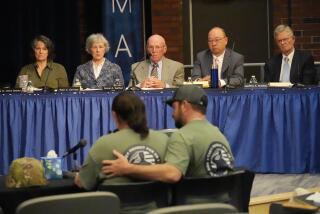Panel urges better care for war vets
WASHINGTON — A presidential commission recommended major steps Wednesday to overhaul the treatment of military personnel wounded in Iraq and Afghanistan, saying that a system criticized for shabby treatment and numbing bureaucracy needed “fundamental change.”
The nation must move beyond “merely patching the system” and apply “a sense of urgency and strong leadership” to create a system focused on the needs of individual patients, the President’s Commission on Care for America’s Returning Wounded Warriors concluded.
President Bush, who met with the panel leaders Wednesday, created the commission in March. A series of reports in the Washington Post drew attention to poor conditions and neglect of outpatients at Walter Reed Army Medical Center in Washington, where approximately 30% of the wounded soldiers are treated.
In its 25-page report, the panel called for a “patient-centered recovery plan” for each seriously injured service member, for which “a corps of well-trained, highly skilled recovery coordinators” would need to be organized. It also proposed what was described as the first major overhaul in the veterans’ disability system in 50 years.
Donna Shalala, a former secretary of Health and Human Services and a commission co-chair, said that the Bush administration could implement 29 of the 35 recommendations without legislation.
“The ball’s in their court,” said former Sen. Bob Dole, the other co-chair, adding that he had told the president: “We’re expecting somebody to follow up on it.”
Shalala said the recommendations could be implemented for less than $500 million, with an ultimate 10-year cost of $1 billion.
The individualized recovery plans would be intended, the report said, “to ensure an efficient, effective and smooth rehabilitation and transition back to military duty or civilian life,” while also creating a single point of contact for patients and families.
One of the chief complaints of those undergoing treatment has been the difficulty they have had in getting information and promptly planning a course of recovery in appropriate facilities -- whether military, veterans or civilian. Often, they say, they must repeat the same information to multiple doctors and others in the healthcare chain.
Seriously wounded troops are regularly assigned multiple caseworkers, each concerned with only one aspect of their treatment.
In calling for a complete restructuring of disability provisions, the commission said the Pentagon and Department of Veterans Affairs needed to “eliminate parallel activities; reduce inequities; and provide a solid base for the return of injured veterans to productive lives.”
It called for aggressive efforts to prevent and treat post-traumatic stress disorder and traumatic brain injury. More than half of the approximately 1,700 injured troops and former fighters polled reported such problems.
In other recommendations, the panel called for strengthening family support programs, ensuring the rapid transfer of patient information between the Pentagon and Veterans Affairs Department and providing continued support for Walter Reed Army Medical Center through 2011, when the Pentagon has said it plans to close the hospital.
Dole, a Republican from Kansas who was seriously wounded in World War II, and Shalala, a Democrat who served in the Clinton administration, brought credibility and bipartisanship to the commission at a time when the Bush administration is being criticized for its conduct of the Iraq war. Reports of failures in the treatment of the soldiers last winter complicated the administration’s efforts to hold on to dwindling support for its Iraq policy.
Bush, after running on the White House’s South Lawn with two soldiers who had lost legs in the Afghanistan and Iraq wars, said he instructed Defense Secretary Robert M. Gates and Veterans Affairs Secretary Jim Nicholson “to look at every one of these recommendations, to take them seriously, and to implement them, so that we can say with certainty that any soldier who has been hurt will get the best possible care and treatment that this government can offer.”
Nicholson announced his resignation earlier this month, saying that he plans to step down no later than Oct. 1.
Rep. Bob Filner (D-Chula Vista), chairman of the House Veterans Affairs Committee, said that the commission came up with “a lot of good stuff,” but that he had expected “a far more thorough shaking-up of the system.” He said that the VA had a backlog of 600,000 disability claims, and that the commission’s proposals did not go far enough. “They’re not completely restructuring anything,” he said.
The scandal over conditions at Walter Reed, once considered a jewel in the military’s far-flung network of hospitals and other facilities, brought a shake-up at the top of the Army’s medical command.
The Army’s surgeon general, Lt. Gen. Kevin C. Kiley, a former commander at Walter Reed, retired under pressure. Maj. Gen. George W. Weightman, the Walter Reed commander when the scandal came to light, was removed, as was Army Secretary Francis J. Harvey.
The most disturbing problems, which arose among soldiers who were outpatients, prompted congressional hearings that saw Republicans and Democrats clamoring to express outrage -- and left some of the most senior military officers embarrassed and deeply apologetic.
At a commission meeting last month, families of injured soldiers told of paperwork lost by the military, endless hours on a telephone helpline that produced little help, and month after month spent trying to correct the military’s errors that forced a lapse in disability checks.
In addition to Dole and Shalala, the commissioners included two seriously wounded veterans, the wife of a third, and four experts in rehabilitation, other medical care, and the problems associated with long-term disabilities.
--
More to Read
Get the L.A. Times Politics newsletter
Deeply reported insights into legislation, politics and policy from Sacramento, Washington and beyond. In your inbox three times per week.
You may occasionally receive promotional content from the Los Angeles Times.










